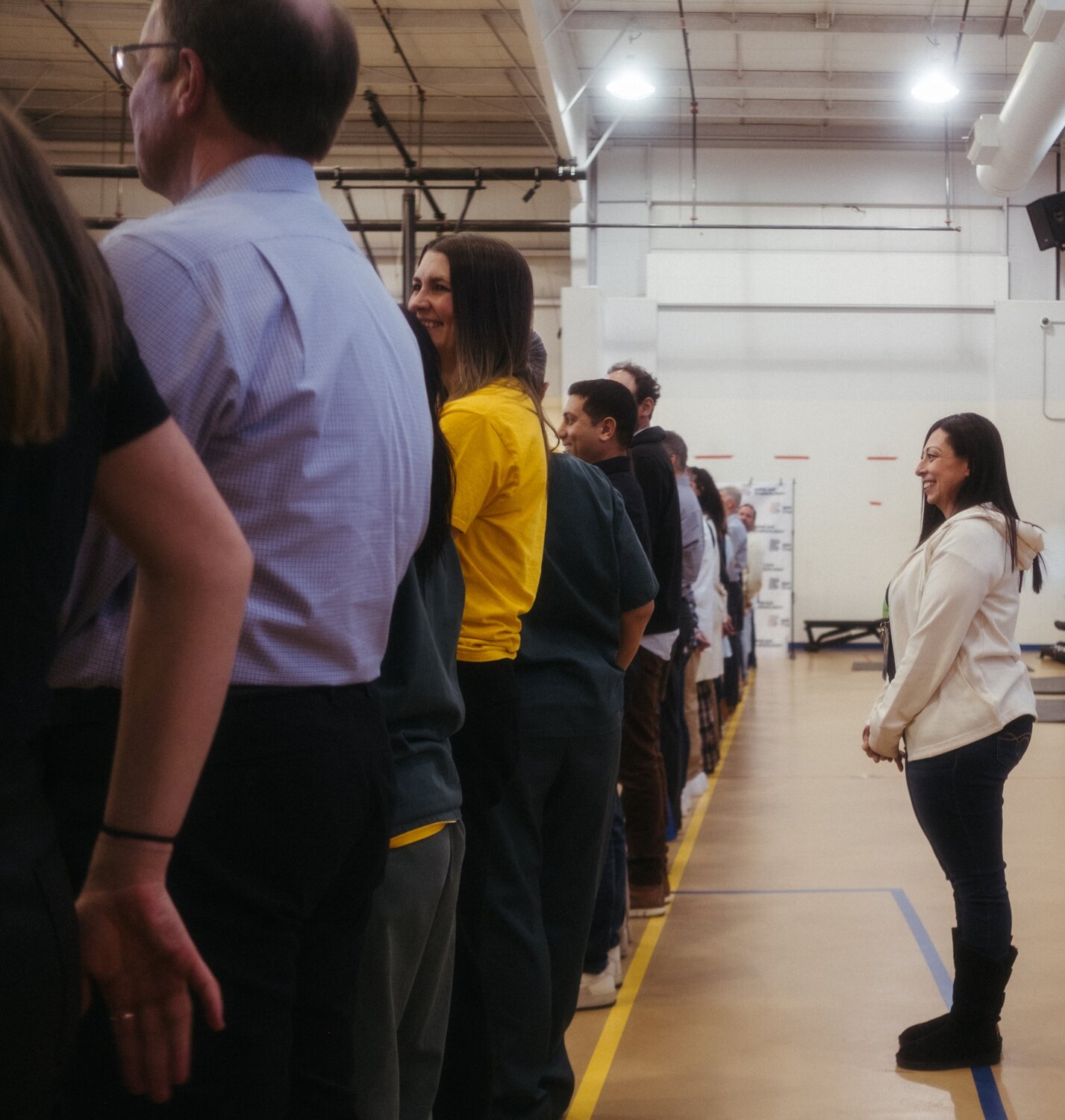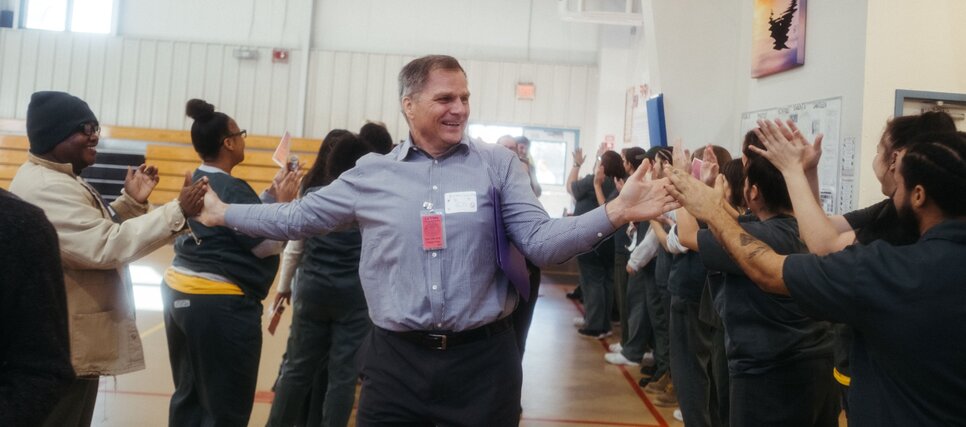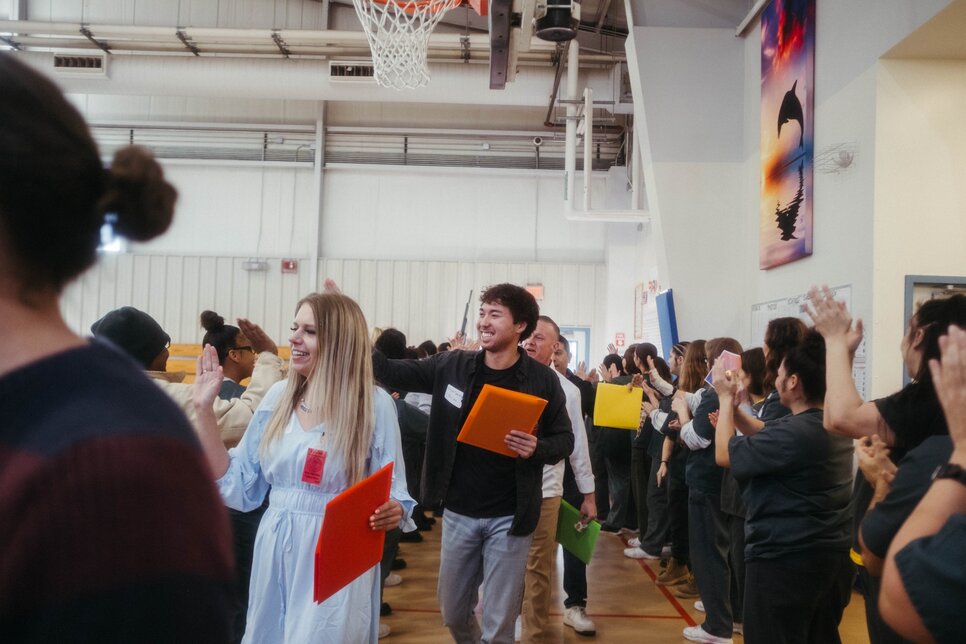Taking the first step: A new class begins ‘Breakthrough’ prison program

PUEBLO, Colo. — Francine sat cross-legged on the gym’s hardwood floor, smiling at the small group of women sitting beside her.
Two years ago, Francine joined a prison program that she credits with changing her life. Now, she’s helping a new cohort of participants navigate that same program. For the women around her, this was day one.
“Every day is going to be a challenge and continuously working on growth,” Francine said to the group. “If we don't do anything, I think we stay stagnant. And then what's the purpose? I think just by you showing up today is an amazing step in that direction.”
Francine is a peer facilitator with Breakthrough, a nonprofit organization that runs an educational program for incarcerated individuals.
At the end of January, the organization launched its fourth cohort at La Vista Correctional Facility, a medium-security prison, where Francine is incarcerated. At Kickoff — the organization’s official name for its launch event — potential participants learn more about the expectations and goals of the program.
After the event, 38 of the 40 participants applied and were accepted to the program. Francine is one of five peer facilitators working with this cohort.
Volunteers play a central role in Breakthrough’s program, providing valuable mentorship and connection to the participants throughout the program. Francine said that for some participants, the volunteers are the only visitors they have.
“Having those people come in weekly or at our events, just showing love, that goes a long way,” she said in December, at the graduation of the previous Breakthrough class.
Activities at Kickoff are designed to start building trust and connection between participants and volunteers. As Francine sat down next to her peers on the gym floor, she prepared to lead a discussion unpacking the previous activity: an emotional exercise called Step to the Line.
Participants and volunteers stood across from each other on two parallel lines taped to the floor. Stacey Putka, executive director of Breakthrough, read aloud a series of statements.
When a statement was true for them, people stood on the line. If it wasn’t true, they stepped back.
“As we do this activity, some feelings of shame or embarrassment might start to pop up,” Putka said to the group. “I want you to fight that feeling and look up and look into the eyes of the people across from you.”
As Putka went through the list of statements — “my parents threw birthday parties for me with my friends every year;” “I heard gunshots in my neighborhood;” “I have suffered from or currently suffer from depression at some point in my life” — volunteers and participants held hands across the aisle to comfort each other.
During this activity, volunteers and participants recognized the similarities and differences in their life experiences.
Statements like “I have done criminal things for which I could have been arrested but wasn't” and “I have somehow escaped the full consequences of my biggest mistakes” highlighted the thin line that separated many of the volunteers from being on the other side of the aisle.
Organizers hope volunteers and participants begin to see the dividing line between them in the exercise as less to do with moral choices and more to do with privilege.

As Breakthrough staff introduced the group to the Step to the Line activity, Francine demonstrated what to do when a statement doesn’t apply. The statement in this example: “I like ice cream.”
Photo: Peter Vo, Rocky Mountain PBS
As Breakthrough staff introduced the group to the Step to the Line activity, Francine demonstrated what to do when a statement doesn’t apply. The statement in this example: “I like ice cream.” Photo: Peter Vo, Rocky Mountain PBS.
“That exercise brings up a lot of anger in me that systematically we have done a lot of terrible things in society to continue the cycle of recidivism, the cycle of incarceration,” volunteer Mackie Kopp said.
Kopp began volunteering with Breakthrough in 2022. She works at Checkr, a background check company that donates to Breakthrough. She said “Step to the Line” is one of the most powerful exercises she’s ever participated in.
“The eye contact was so uncomfortable at times, but then so amazingly beautiful at many other times,” she said.
Kopp remembers when Francine was a participant in the program. Kopp said Francine wasn’t the most vocal leader when she met her, and to see her in her current role as a peer facilitator is inspiring.
“Being able to watch the women come in who maybe never thought of having a business, or even probably never even had a job in their life, be able to gain all those skills and to watch that transformation on the sidelines is one of the best gifts that I have received,” Francine said in December.
Breakthrough’s program is designed to instill an entrepreneurial, professional mindset in its participants, while teaching them the soft skills that will help them successfully reintegrate into society after their release. The program is also open to people who may not be released.
Rocky Mountain PBS will be following this cohort of participants throughout their experience with the program.
Carly Rose is the journalism intern at Rocky Mountain PBS. Carlyrose@rmpbs.org.
Peter Vo is a multimedia journalist at Rocky Mountain PBS. Petervo@rmpbs.org.


